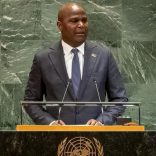Mozambique: Six deaths related to mining activities recorded in Tete - AIM report
Mozambique: “Revision of Electricity Law will influence energy tariff” – CTA

File photo: Lusa
The Confederation of Mozambican Associations (CTA) says that the revision of the Electricity Law proposed by the government will allow the entry, in the medium and long term, of new providers in the market and, consequently, influence the energy tariff charged to the final consumer.
This view was advanced in Maputo on Thursday, March 17, by the president of the Natural Resources and Energy department at the CTA, Simone Santi, who was speaking to the press after a meeting with the Commission on Agriculture, Economy and Environment (CAEA) of the Assembly of the Republic.
“In general we, the private sector, consider the revision of the law paramount, given that we advocate national and regional tariff competitiveness as the ultimate goal of the process of energy transition and universal energy,” Santi said.
The CTA also proposes that the Electricity Law clarifies the role of each player participating in the generation of energy in the country, as well as the regulation of matters related to electricity production for the use of third parties.
“We believe that the role of the regulator and the national electricity manager should be clear, as conflicts sometimes occur. For example, we believe that energy planning should be the responsibility of the government,” Santi said.
Santi further made known that the CTA believes that the government has already taken significant steps towards involving the private sector in the Electricity Law, since it is committed to an energy transition based on universal access to energy, as well as to industrialization and the addition of added value.
“We are of the opinion that the law to be approved should more clearly define the role and the competencies of Electricidade de Moçambique, of the Energy Regulatory Authority and of the government itself,” Santi stressed.
Regarding the concessions regime, the CTA defends a special regime for the electricity sector in which the government acts as regulator only. He explained that the private sector must now hold 100% ownership of the enterprise in relation to the current regime, in which private participation will be governed by the Public-Private Participations (PPP) law.
The law must also provide for matters related to storage in the case of energy production from renewable sources – which, according to Santi, will later be the subject of regulation – in order to allow better energy management in times of scarcity.












Leave a Reply
Be the First to Comment!
You must be logged in to post a comment.
You must be logged in to post a comment.